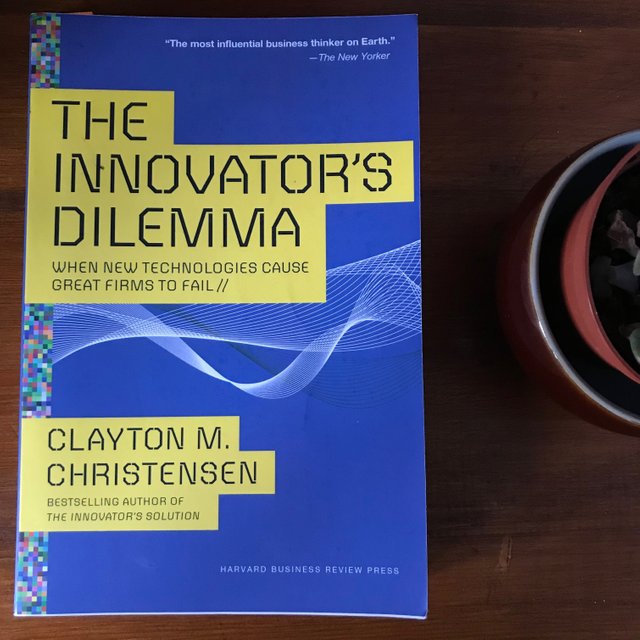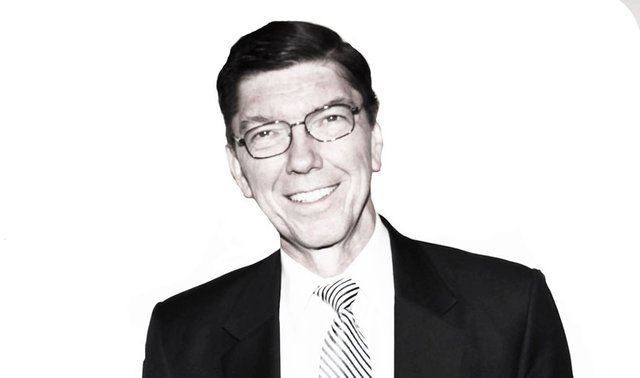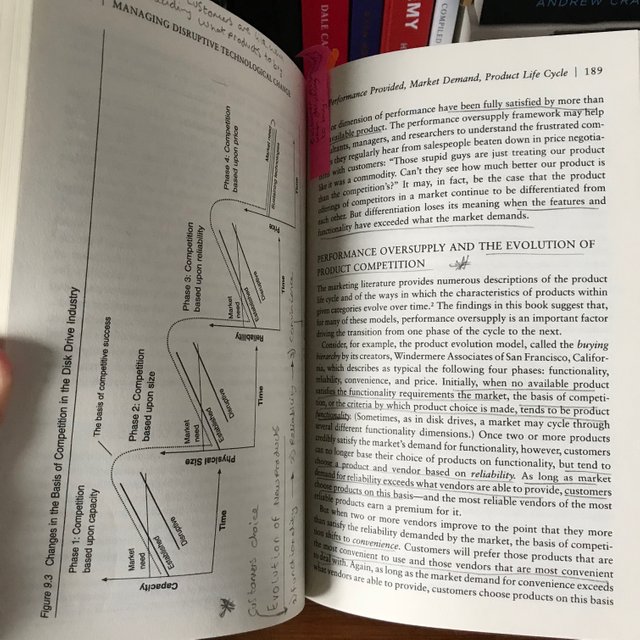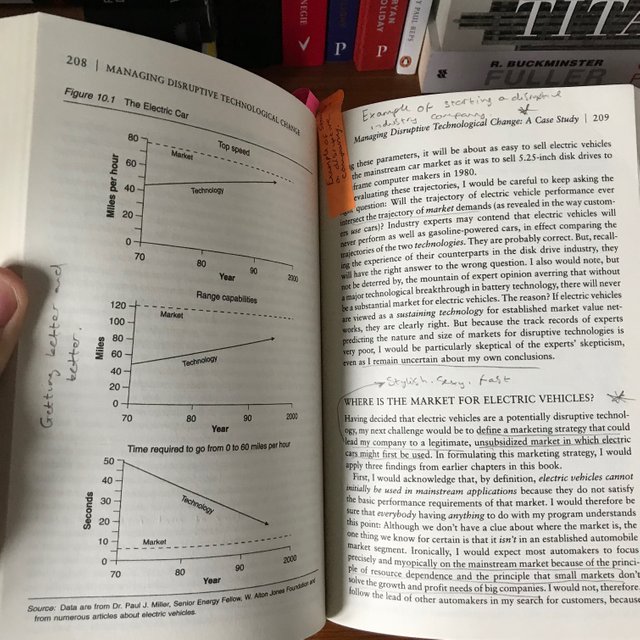The Innovators Dilemma - Bookclub #49

About the Author
Clayton Christensen is regarded as one of the world’s top experts on innovation and growth and his ideas have been widely used in industries and organizations throughout the world. A 2011 cover story in Forbes magazine noted that ‘’Everyday business leaders call him or make the pilgrimage to his office in Boston, Mass. to get advice or thank him for his ideas.’’ In 2011 in a poll of thousands of executives, consultants and business school professors, Christensen was named as the most influential business thinker in the world.
Born in Salt Lake City, Utah, Clay worked as a missionary for his church in the Republic of Korea from 1971 to 1973, where he learned to speak fluent Korean. He continues to serve in his church in as many ways as he can.

He received his B.A. in economics, summa cum laude, from Brigham Young University and an M.Phil. in applied econometrics from Oxford University, where he studied as a Rhodes Scholar. He subsequently received an MBA with High Distinction from the Harvard Business.
Prior to his academic career, Clayton worked as a management consultant with BCG in their Boston office and helped co-found Ceramics Process Systems, a Massachusetts-based advanced materials company. He has subsequently helped establish many other successful enterprises, including the innovation consulting firm Innosight, the public policy think tank Innosight Institute, and the investment firm Rose Park Advisors.
(http://www.claytonchristensen.com/biography/)
A little bit about the book
The Innovator's Dilemma deals with the business world and the fight startups have to become relevant as well as an existing company's fight to stay relevant in a particular industry. Clayton Christensen focuses directly on two types of technologies which he calls:
- Sustaining technologies
- Disrupting technologies
Sustaining technologies are those that look at current technology or resources in a particular industry and attempts to improve those technologies directly in order to become or remain the industry leader. This can be achieved by having the ability to charge less for the exact same product or to innovate slightly to improve the efficiency or capacity of a product.
These instances are mostly achieved by industry giants because they already have the spending power and control over manufacturing licences to improve the products already on the market.

On the other hand we have Disrupting technologies and these are those which completely shake up the dynamic of an industry and consumer behaviour. They are often products that create a sharp shift in demand and consumer behaviour leading to new trends due to the fact they solve a problem a consumer has in an entirely different way; opening up the market to a whole new set of consumers.
The Disrupting technologies are mostly achieved by startups or by new subsidiaries created or acquired by established corporations.
This gives hope to startups and is why new companies generally have an advantage over big corporations because they can target niche markets due to lower shareholder/stockholder revenue demands. Therefore by targetting these niche markets they often open up industries to a new set of consumers. It is up to the management of the big corporations to be aware of growing trends and to attempt to bully out the startups or even to acquire them in order to maintain their relevancy.
We saw this in Yahoo's attempt to acquire Facebook for $1Bn in the summer of 2006. They saw that there was a new way to share and convey information that Facebook achieved by targetting in a niche market of consumers first (college students). This obviously gained momentum and disrupted the whole industry of sharing information and social interaction.

This has lead to Yahoo's slow decline as an industry leader - so how could they avoid this? Christensen would argue that this is avoided by making sure that the company's values, processes (how information travels between employees, suppliers and consumers) and resources are constantly being consciously improved and thought about. If these three things are not being catered for, it becomes difficult for a company's management to solve issues like dealing with a changing consumer taste, no matter how competent they are.
There is much more to the book that I've stated here, and it is an enjoyable read for anyone interested in industries, corporations, startups and acquisitions.
Have a great weekend!
The Bookclub
Ego is the Enemy, Ryan Holiday
The Wisdom Of Insecurity, Alan Watts
Tools of Titans, Tim Ferris
Homo-Deus, Yuval Noah Harari
Radical Acceptance, Tara Brach
Born a crime, Trevor Noah
How brands grow, Byron Sharp
Tales of modern Russia, Peter Pomerantsev
Stone Soup, Marcia Brown
How to get filthy rich in rising Asia, Mohsin Hamid
The Art of War, Sun Tzu
Why Bob Dylan Matters, Richard F. Thomas
On the Shortness of Life, Seneca
Not Fade Away - A short life well lived, Peter Barton
Blockchain Revolution, Alex and Don Tapscott
What I know for sure, Oprah Winfrey
Man's Search for Meaning, Viktor E. Frankl
Creativity Inc., Ed Catmull
Meditations, Marcus Aurelius
The Rational Optimist, Matt Ridley
What Makes Sammy Run? , Budd Schulberg
How to Develop Self-Confidence in Public Speaking, Dale Carnegie
How to Win Friends and Influence People, Dale Carnegie
As a Man Thinketh, James Allen
The Four Agreements, Don Miguel Ruiz
The Magic of Thinking Big, David J. Schwartz
The Great Philosophers, Edited by Ray Monk & Frederic Raphael
The Outsiders, William N. Thorndike
Invested, Danielle & Phil Town
The Last Hours of Ancient Sunlight, Thom Hartmann
The Obstacle is the Way, Ryan Holiday
Zen Flesh, Zen Bones, Paul Reps
The Prince, Niccolo Maciavelli
Think and Grow Rich, Napoleon Hill
Unshakeable, Tony Robbins
The War of Art, Steven Pressfield
Leonardo Da Vinci, Walter Issacson
Onwards, Howard Schultz
The Long and Short of It, John Kay
Prisoners of Geography, Tim Marshall
Total Recall, Arnold Schwarzenegger
Steve Jobs, Walter Issacson
Thus spoke Zarathustra, Freidrich Nietzche
The Everything Store, Brad Stone
Zero to One, Peter Thiel
Zen and the Art of Happiness. Chris Prentiss
The Lessons of History, Will and Ariel Durant
Living with a Seal, Jesse Itzler